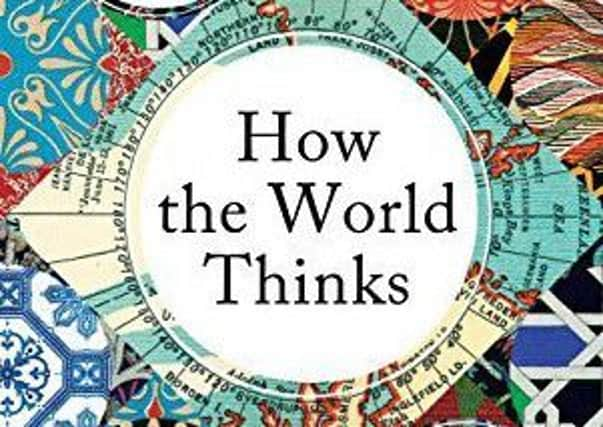Book review: How The World Thinks, by Julian Baggini


I studied during the period where there was a turf war between “Anglophone” philosophy – concerned with logic, deduction, questions of law and how to make language more like mathematics, the tradition of Locke, Hume and Russell – and “Continental” philosophy, which valued élan, rhetoric, subtlety and paradox. Even within that, there was the split between the French thinkers, such as Sartre, Derrida and Paul Ricœur, and the slightly more uptight and difficult “Germans”, such as Kant and Heidegger and Kojève. Oddly, nobody seems to talk about Spanish philosophy, or Latvian philosophy, or even Manx philosophy. That is one of the reasons why Julian Baggini’s new book is so timely and so important. He has written, as a self-proclaimed “journalist-philosopher”, a number of very good books indeed, but this, I would say, is his best to date.
You may have noticed that the list of the philosophers above have one thing in common despite their differences of opinion. They are all white, European men. Baggini shifts the focus to look at the philosophies of non-European cultures, and the results are well worth pondering.
Advertisement
Hide AdHis book begins with an examination of the Axial Age, and the idea that different cultures in different places came up at the same time with roughly the same moral grounding: either “do not do to others what you would not want done to you” or “behave towards people as you would wish them to behave towards you”. From this kernel unfolds an enthralling complexity. Baggini is as much a sociologist of philosophers as a philosopher himself, and the ideas are engagingly twinned with various academic conferences and how the participants behave towards each other. Who gives deference? Who has a bit of a dust-up? Who denies a difference between philosophy and theology? Who is, frankly, incomprehensible and pleased at being so – the old idea of the koan, the one hand clapping or the colour of the wind? At each encounter with non-Western philosophy, Baggini is alert to the problem that, broadly stated, to a man with a hammer everything looks like a nail. Certain ideas – karma, or mu, or xiào – are difficult to translate and Baggini admits that such concepts can be brought over but perhaps never wholly understood by those who are intrigued by such differences. There is a humility here which is commendable. To try to fit other philosophical traditions into our idea of “philosophy” is both arrogant and blinkered. There are always things to learn.
As a keen-eyed watcher – and, ironically, non-Western traditions often use a word for seeing to mean philosopher – Baggini gives a radical reading of the groundedness of philosophies. Why is the West so fixed on the individual as the significant moral actor, yet the East seems more concerned with obedience? It’s a proposition rather than a proof, but it has legs on it. The chapters on the difference between individuality and intimacy, between interconnection and “I myself alone” make the reader think about the priorities of our own moral judgments.
Towards the end, Baggini very graciously acknowledges that he has not looked at Russian philosophy, and directs the reader to Lesley Chamberlain’s Motherland: A Philosophical History Of Russia (which, by the way, is an astonishing book). What is curiously absent is any discussion of that sliver of land between East and West where Judean and then Christian ethical thinking thrived. It is clearly not an offshoot of Plato and Aristotle, nor was it integrated into other traditions. I look forward to Baggini’s book on such moral strictures. He does not compromise on his own scepticism, particularly when it comes to questions of personal identity – to what extent is a Dalai Lama really a reincarnation? Do Chinese philosophers really believe that one has to honour the ghosts of ancestors for supernatural rather than merely customary reasons? There is a kindly aspic in which he approaches this. At the end of the book he comes up with the idea of the “cubist perspective”, of seeing all things from all angles in one frame, and the idea that simple questions should be broken down into complex parts. There is a deep pluralism in philosophy, just as, he wittily says, Japanese privet thrives over here but you’d have a hard time growing coffee.
Of all the various philosophical forms, Baggini seems to have a particular affinity with Japan. Beginning as a vaguely cynical and un-immersed observer, he expects something hectic and cartoon-like to be there, but finds instead a society where harmony is not just cherry blossoms fading but simple human courtesy on the underground. Likewise, his remarks on the lack of – shall we call it manners – in Western culture strikes a chord which must have been in his mind before whatever today’s Trump blurt is.
Philosophy, supposedly, was the art of dying well. This ingenious and open-hearted book is about the art of living well, something the West’s philosophy has often neglected. - Stuart Kelly
How The World Thinks A Global History Of Philosophy, by Julian Baggini, Granta, £20